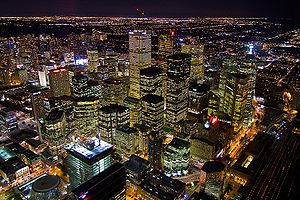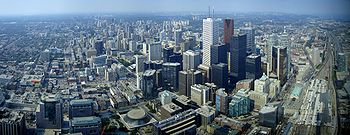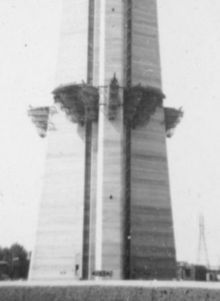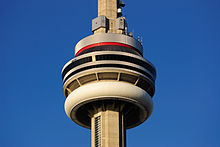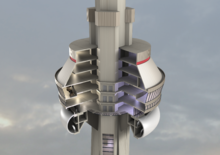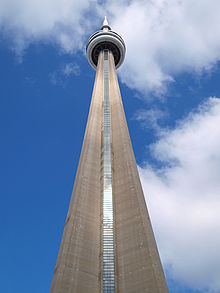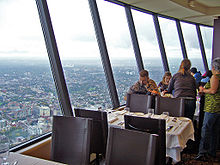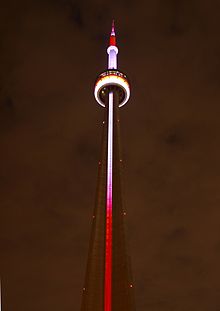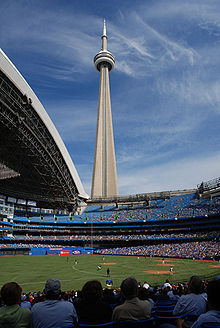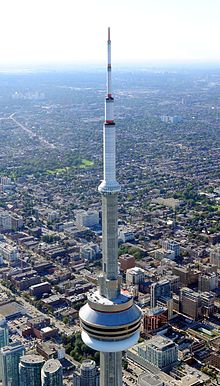- CN Tower
-
CN Tower 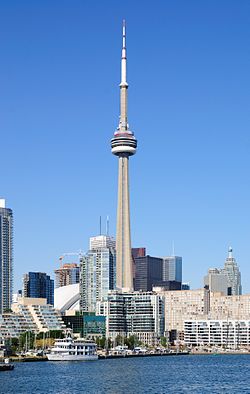
CN Tower is the world's 5th tallest free-standing structure.[1]Alternative names Canadian National Tower, Canada's National Tower General information Status Complete Type observation, telecommunications, attraction, restaurant Location Toronto, Ontario, Canada Coordinates 43°38′33″N 79°23′14″W / 43.6426°N 79.3871°WCoordinates: 43°38′33″N 79°23′14″W / 43.6426°N 79.3871°W Construction started 1972 Completed 1976 Height Antenna spire 553.33 m (1,815.4 ft) Roof 457.2 m (1,500.0 ft) Top floor 446.5 m (1,464.9 ft) Technical details Floor count 147 (equivalent) Elevator count 6 Design and construction Architect John Andrews Architect
WZMH ArchitectsReferences [2][3] The CN Tower is a communications and observation tower in Downtown Toronto, Ontario, Canada. Standing 553.33 metres (1,815.4 ft) tall,[4] it was completed in 1976, becoming the world's tallest free-standing structure and world's tallest tower at the time. It held both records for 34 years until the completion of the Burj Khalifa and Canton Tower. It remains the tallest free-standing structure in the Western Hemisphere, a signature icon of Toronto's skyline, and a symbol of Canada,[5][6] attracting more than two million international visitors annually.[7]
Its name "CN" originally referred to Canadian National, the railway company that built the tower. Following the railway's decision to divest non-core freight railway assets, prior to the company's privatization in 1995, it transferred the tower to the Canada Lands Company, a federal Crown corporation responsible for real estate development. Since the name CN Tower became common in daily usage, the abbreviation was eventually expanded to Canadian National Tower or Canada's National Tower. However, neither of these names is commonly used.[8]
In 1995, the CN Tower was declared one of the modern Seven Wonders of the World by the American Society of Civil Engineers. It also belongs to the World Federation of Great Towers, where it holds second-place ranking.
Contents
History
The idea of the CN Tower originated when the 1968 Canadian National Railway had a desire to build a large TV and radio communication platform to serve the Toronto area, as well as demonstrate the strength of Canadian industry and CN in particular. These plans evolved over the next few years, and the project became official in 1972. The tower would have been part of Metro Centre (see CityPlace), a large development south of Front Street on the Railway Lands, a large railway switching yard that was being made redundant by newer yards outside the city. Key project team members were NCK Engineering as structural engineer; John Andrews Architects; Webb, Zerafa, Menkes, Housden Architects; Foundation Building Construction; and Canron (Eastern Structural Division).
At the time, Toronto was a boom town, and the late 1960s and early 1970s had seen the construction of numerous large skyscrapers in the downtown core, most notably First Canadian Place. This made broadcasting into the downtown area very difficult due to reflections off the buildings. The only solution was to raise the antennas above the buildings, demanding a tower over 300 metres (984 ft) tall. Additionally, at the time, most data communications took place over point-to-point microwave links, whose dish antennae covered the roofs of large buildings. As each new skyscraper was added to the downtown, former line-of-sight links were no longer possible. CN intended to rent "hub" space for microwave links, visible from almost any building in the Toronto area. The CN Tower can be seen from at least as far away as Kennedy Street in Aurora, Ontario, approximately 40 kilometres (25 mi) to the north, 60 km east of Toronto, in Oshawa, and from several points on the south shore of Lake Ontario, 48 kilometres (30 mi) to the south in New York state in the United States.[original research?]
The original plan for the tower envisioned a tripod consisting of three independent cylindrical "pillars" linked at various heights by structural bridges. Had it been built, this design would have been considerably shorter, with the metal antenna located roughly where the concrete section between the main level and the Sky Pod lies today. As the design effort continued, it evolved into the current design with a single continuous hexagonal core to the Sky Pod, with three support legs blended into the hexagon below the main level, forming a large Y-shape structure at the ground level.
The idea for the main level in its current form evolved around this time, but the Sky Pod was not part of the plans until some time later. One engineer in particular felt that visitors would feel the higher observation deck would be worth paying extra for, and the costs in terms of construction were not prohibitive. It was also some time around this point that it was realized that the tower could become the world's tallest structure, and plans were changed to incorporate subtle modifications throughout the structure to this end.
On June 26, 1986, the ten-year anniversary of the tower's opening, high-rise firefighting and rescue advocate Dan Goodwin, in a sponsored publicity event, used his hands and feet to climb the outside of the tower, a feat he performed twice on the same day. Following both ascents, he used multiple rappels to descend to the ground.[9]
On September 12, 2007, the CN Tower was surpassed by Burj Khalifa as the world's tallest free-standing structure.[10]
Construction
Construction on the CN Tower began on February 6, 1973 with massive excavations at the tower base for the foundation. By the time the foundation was complete, 56,000 t (61,729 short tons; 55,116 long tons) of dirt and shale were removed to a depth of 15 metres (49.2 ft) in the centre, and a base incorporating 7,000 cubic metres (9,156 cu yd) of concrete with 450 tonnes (496 short tons; 443 long tons) of rebar and 36 tonnes (40 short tons; 35 long tons) of steel cable had been built to a thickness of 6.7 metres (22.0 ft). This portion of the construction was fairly rapid, with only four months needed between the start and the foundation being ready for construction on top.
To build the main support pillar, a hydraulically-raised slipform was built at the base. This was a fairly impressive engineering feat on its own, consisting of a large metal platform that raised itself on jacks at about 6 metres (19.7 ft) per day as the concrete below set. Concrete was poured continuously by a team of 1,532 people until February 22, 1974, during which it had already become the tallest structure in Canada, surpassing the recently built Inco Superstack, which was built using similar methods. In total, the tower contains 40,500 cubic metres (52,972 cu yd) of concrete, all of which was mixed on-site in order to ensure batch consistency. Through the pour, the vertical accuracy of the tower was maintained by comparing the slip form's location to massive plumb-bobs hanging from it, observed by small telescopes from the ground. Over the height of the tower, it varies from true vertical accuracy by only 29 millimetres (1.1 in).
In August 1974, construction of the main level commenced. Using 45 hydraulic jacks attached to cables strung from a temporary steel crown anchored to the top of the tower, twelve giant steel and wooden bracket forms were slowly raised, ultimately taking about a week to crawl up to their final position. These forms were used to create the brackets that support the main level, as well as a base for the construction of the main level itself. The Sky Pod was built of concrete poured into a wooden frame attached to rebar at the lower level deck, and then reinforced with a large steel compression band around the outside.
The antenna was originally to be raised by crane as well, but during construction the Sikorsky S-64 Skycrane helicopter became available when the United States Army sold off theirs to civilian operators. The helicopter, named "Olga", was first used to remove the crane, and then flew the antenna up in 36 sections. The flights of the antenna pieces were a minor tourist attraction of their own, and the schedule was printed in the local newspapers. Use of the helicopter saved months of construction time, with this phase taking only three and a half weeks instead of the planned six months. The tower was topped off on April 2, 1975 after 26 months of construction, officially capturing the height record from Moscow's Ostankino Tower, and bringing the total mass to 118,000 tonnes (130,073 short tons; 116,136 long tons).
Two years into the construction, plans for Metro Centre were scrapped, leaving the tower isolated on the Railway Lands in what was then a largely abandoned light-industrial space. This caused serious problems for tourists to access the tower. Ned Baldwin, project architect with John Andrews, wrote at the time that "All of the logic which dictated the design of the lower accommodation has been upset," and that "Under such ludicrous circumstances Canadian National would hardly have chosen this location to build."[11]
Opening
The CN Tower opened to the public on June 26, 1976, although the official opening date was October 1, 1976. The construction costs of approximately CDN$63 million ($243 million in 2011 dollars)[12] were repaid in fifteen years. Canadian National Railway sold the tower prior to taking the company private in 1995, when they decided to divest themselves of all operations not directly related to their core freight shipping businesses.
As the area around the tower was developed, particularly with the introduction of the Metro Toronto Convention Centre in 1984 and the SkyDome in 1989, the former Railway Lands were redeveloped and the tower became the centre of a newly developing entertainment area. Access was greatly improved with the construction of the SkyWalk in 1989, which connected the tower and SkyDome to the nearby railway and subway station, Union Station and, in turn, to the city's PATH underground pedestrian system. By the mid-1990s, it was the centre of a thriving tourist district. The entire area continues to be an area of intense building, notably a boom in condominium construction in the 2000s and the 2010s.
From 1997 to January 2004, TrizecHahn Corporation managed the tower and instituted several expansion projects including a $26 million entertainment expansion and revitalization that included the addition of two new elevators (to a total of six) and the relocation of the staircase from the north side leg to inside the core of the building, a conversion that also added nine stairs to the climb.
The CN Tower was closed during the G-20 summit on June 26–27, 2010, for security reasons, given its proximity to the Metro Toronto Convention Centre.
Structure
The CN Tower consists of several substructures. The main portion of the tower is a hollow concrete hexagonal pillar containing the six elevators, stairwells, and power and plumbing connections. On top of this is a 102-metre (334.6 ft) tall metal broadcast antenna, carrying TV and radio signals. There are two visitor areas: the main deck level (formerly known as SkyPod) located at 346 metres (1,135 ft), and the higher Sky Pod (formerly known as "Space Deck") at 446.5 metres (1,465 ft),[13] just below the metal antenna. The hexagonal shape can be seen between the two areas; however, below the main deck, three large supporting legs give the tower the appearance of a large tripod.
The main deck level is seven storeys, some of which are open to the public. Below the public areas — at 338 metres (1,108.9 ft) — is a large white donut-shaped radome containing the structure's microwave receivers. The glass floor and outdoor observation deck are at 342 metres (1,122.0 ft). The glass floor has an area of 24 square metres (258 sq ft) and can withstand a pressure of 4,100 kilopascals (595 psi). The floor's thermal glass units are 64 millimetres (2.5 in) thick, consisting of a pane of 25-millimetre (1.0 in) laminated glass, 25 millimetres (1.0 in) airspace and a pane of 13-millimetre (0.5 in) laminated glass. Some people experience acrophobia when standing on the glass floor and looking down at the ground 342 metres (1,122.0 ft) below. In 2008, one elevator was upgraded to add a glass floor panel, believed to have the highest vertical rise of any elevator equipped with this feature.[14] The Horizons Cafe and the lookout level are at 346 metres (1,135.2 ft). The 360 Restaurant, a revolving restaurant that completes a full rotation once every 72 minutes, is at 351 metres (1,151.6 ft). When the tower first opened, it also featured a disco named Sparkles, billed as the highest disco and dance floor in the world.[15] On August 1, 2011, the CN Tower opened the EdgeWalk, in which thrill-seekers can walk on and around the roof of the main pod of the tower at 356 metres (1,168.0 ft), which is directly above the 360 Restaurant.[16]
The Sky Pod is the second-highest public observation deck in the world, surpassed only by the Shanghai World Financial Center.[17] On a clear day, it is possible to see 100 to 120 kilometres (62–75 mi) away, to the city of Rochester across Lake Ontario in the United States, the mist rising from Niagara Falls, or the shores of Lake Simcoe.[18]
A metal staircase reaches the main deck level after 1,776 steps,[19] and the Sky Pod 100 metres above after 2,579 steps; it is the tallest metal staircase on Earth. These stairs are intended for emergency use only and are not open to the public, except for two times per year for charity stair-climb events.[20][21] The average climber takes approximately 30 minutes to climb to the base of the radome, but the fastest climb on record is 7 minutes and 52 seconds in 1989 by Brendan Keenoy, an Ontario Provincial Police Officer.[21] In 2002, Canadian Olympian and Paralympic champion Jeff Adams climbed the stairs of the tower in a specially designed wheelchair. The stairs were originally on one of the three sides of the tower, with a glass view, but these were later replaced with the third elevator pair and the stairs were moved to the inside of the core.[19] Top climbs on the new, windowless stairwell used since around 2003 have generally been over 10 minutes.[22]
Falling ice danger
A freezing rain storm on March 2, 2007 resulted in a layer of ice several centimetres thick forming on the side of the tower and other downtown buildings. The sun thawed the ice, and winds of up to 90 km/h (56 mph) blew some of it away from the structure. There were fears that cars and windows of nearby buildings would be smashed by large chunks of ice. In response, police closed some streets surrounding the tower. During morning rush hour on March 5, police expanded the area of closed streets to include the Gardiner Expressway 310 metres (1,017 ft) away from the tower, as increased winds blew the ice farther away, as far north as King Street, 490 metres (1,608 ft) away, where a taxicab window was shattered.
On March 6, the Gardiner Expressway was reopened after winds died down.[23]
Safety features
In August 2000, a fire broke out at the Ostankino Tower in Moscow. It killed three people and caused extensive damage. The fire was blamed on poor maintenance and outdated equipment. The failure of the fire-suppression systems and the lack of proper equipment for firefighters allowed the fire to destroy most of the interior and spark fears the tower might even collapse.
The Ostankino Tower was completed only nine years before the CN Tower, and is only 13 metres (44 ft) shorter.[24] The parallels between the towers led to some concern that the CN Tower could be at risk of a similar tragedy. However, Canadian officials subsequently stated that it is "highly unlikely" that a similar disaster could occur at the CN Tower as it has important safeguards that were not present in the Ostankino Tower. Specifically, officials cited:
- the fireproof building materials used in the tower's construction,
- frequent and stringent safety inspections,
- an extensive sprinkler system,
- a 24-hour emergency monitoring operation,
- two 68,160-litre (15,000-imperial gallon) water reservoirs at the top, which are automatically replenished,
- a fire hose at the base of the structure capable of sending 2725 litres (600 imperial gallons) a minute to any location in the tower,
- a ban on gas appliances anywhere in the tower (including the restaurant in the main pod),
- an elevator that can be used during a fire as it runs up the outside of the building and can be powered by three emergency generators at the base of the structure (unlike the elevator at the Ostankino tower, which malfunctioned).[25]
Officials also noted that the CN Tower has an excellent safety record and that there has never been an accidental fire in the tower since it was opened in 1976.[25] Moreover, other supertall structures built between 1967 and 1976 – such as the Willis Tower (formerly the Sears Tower), the World Trade Center (until its destruction on September 11, 2001), the Fernsehturm Berlin, the Aon Center, the John Hancock Center, and First Canadian Place – also have excellent safety records, which suggests that the Ostankino Tower accident was a rare safety failure, and that the likelihood of similar events occurring at other supertall structures is extremely low.
Lighting
The CN Tower was once lit at night with incandescent lights, but they were removed in 1997, because they were inefficient and expensive to repair. In June 2007, the tower was outfitted with 1,330 super-bright LED lights inside the elevator shafts, shooting up over the main pod and upward to the top of the tower's mast to light the tower from dusk until 2 a.m. The official opening ceremony took place on June 28 before the Canada Day holiday weekend. The tower changes its lighting scheme on holidays and to commemorate major events. After the 95th Grey Cup in Toronto, the tower was lit up in green and white to represent the colours of the Grey Cup champion Saskatchewan Roughriders.[26] On August 27, 2011, the tower was lit in orange from sundown to sunrise on August 28, 2011 to commemorate the death of the federal New Democratic Party leader Jack Layton.[27]
Programmed from a desktop computer with a wireless network interface controller, the LEDs use less energy to light than the previously used incandescent lights (10% less energy than the dimly lit version and 60% less than the brightly lit version).[28] The estimated cost to use the LEDs is $1,000 per month.[citation needed]
During the spring and autumn bird migration seasons, the lights will be turned off to comply with the voluntary Fatal Light Awareness Program, which "encourages buildings to dim unnecessary exterior lighting to mitigate bird mortality during spring and summer migration."[29]
Size comparisons
The CN Tower is the tallest freestanding structure in the Americas. Currently,[when?] the only other freestanding structure in the Americas to exceed 500 m (1,640.4 ft) in height is the Willis Tower in Chicago, which stands at 527 m (1,729.0 ft) when measured to its pinnacle. One World Trade Center, currently under construction in New York City, is expected to have a pinnacle height of 1,776 ft (541.3 m), or approximately 12 m (39.4 ft) shorter than the CN Tower. Due to the symbolism of the number 1776 (the year of the signing of the United States Declaration of Independence), the height of One World Trade Center is unlikely to be increased. The Chicago Spire was expected to exceed the height of the CN Tower, but it was cancelled in early 2010.[30]
Between 2010 and 2013, the rank of the CN Tower in the list of the world tallest structures is expected to drop considerably. At least seven structures currently under construction, all of which are scheduled to be completed by 2013, are expected to exceed the CN Tower's height of 553.33 metres once completed.[citation needed]
Controversy over the "world's tallest" title
Guinness World Records has called the CN Tower "the world's tallest self-supporting tower" and "the world's tallest free-standing tower".[31][32] Although Guinness did list this description of the CN Tower under the heading "tallest building" at least once,[32] it has also listed it under "tallest tower", omitting it from its list of "tallest buildings."[31] In 1996, Guinness changed the tower's classification to "World's Tallest Building and Freestanding Structure". Emporis and the Council on Tall Buildings and Urban Habitat both list the CN Tower as the world's tallest free-standing structure on land, and specifically state that the CN Tower is not a true building, thereby awarding the title of world's tallest building to Taipei 101, which is 44 metres (144 ft) shorter than the CN Tower.[33][34] The tower's official web site, however, still claims it is the "world's tallest building" as of 2008.[35]
Although the CN Tower contains a restaurant, a gift shop, and multiple observation levels, it does not have floors continuously from the ground, and therefore it is not considered a building by the Council on Tall Buildings and Urban Habitat (CTBUH) or Emporis. CTBUH defines a building as "a structure that is designed for residential, business, or manufacturing purposes. An essential characteristic of a building is that it has floors."[34] The CN Tower and other similar structures – such as the Ostankino Tower in Moscow, Russia; the Oriental Pearl Tower in Shanghai, China; the Stratosphere Tower in Las Vegas, Nevada; and the Eiffel Tower in Paris, France — are categorized as "towers", which are free-standing structures that may have observation decks and a few other habitable levels, but do not have floors from the ground up. The CN Tower is the tallest tower by this definition.[33]
Taller than the CN Tower are numerous radio masts and towers which are held in place by guy-wires, the tallest being the KVLY-TV mast in North Dakota at 628 metres (2,060 ft) tall, leading to a distinction between these and "free-standing" structures. Additionally, the Petronius Platform stands 610 metres (2,001 ft) above its base on the bottom of the Gulf of Mexico, but only the top 75 metres (246 ft) of this oil and natural gas platform are above water, and the structure is thus partially supported by its buoyancy. Like the CN Tower, none of these taller structures are commonly considered buildings.
On September 12, 2007, Burj Khalifa, which is a hotel, residential and commercial building in Dubai, United Arab Emirates and was formerly known as Burj Dubai, passed the CN Tower's 553.33 metre[4] height. The CN Tower held the record of tallest free-standing structure on land for over 30 years.[10]
After Burj Khalifa had been formally recognized by the Guinness Book of World Records as the world's tallest freestanding structure, Guinness re-certified CN Tower as the world's tallest freestanding tower.[36] The tower definition used by Guinness was defined by Council on Tall Buildings and Urban Habitat as 'a building in which less than 50% of the construction is usable floor space'. Guinness World Records editor-in-chief Craig Glenday announced Burj Khalifa was not classified as tower because it has too much usable floor space to be considered to be a tower.[37] CN Tower still held world records for highest above ground wine cellar (in 360 Restaurant) at 351 metres, highest above ground restaurant at 346 metres (Horizons Restaurant),[38] and tallest free-standing concrete tower during Guinness's recertification. The CN Tower was surpassed by the Canton Tower in Guangzhou, China, which stand at 600 m tall, as the world's tallest tower, in 2010. The tower, as of 2010, stands as the third-tallest free-standing structure on land in the world and the second-tallest free-standing tower.
Other height records
Since the construction of the tower had been completed, it has gained following world height records:[39]
Record Owner Value Time period Succeeded by World's highest public observation gallery Sky Pod 447 metres (1,467 ft) ? - World's highest bar Horizons Restaurant 346 metres (1,135 ft) 2009-09-21 – present - World's longest metal staircase CN Tower 2,579 steps ? - World's highest glass floor CN Tower 342 metres (1,122 ft) 2009 Willis Tower, Chicago World's highest and largest revolving restaurant 360 Restaurant 351 metres (1,152 ft) ? - World's highest wine cellar 360 Restaurant 351 metres (1,152 ft) ? - Use
The CN Tower has been and continues to be used as a communications tower for a number of different media and by numerous companies.
Television broadcasters
Frequency VHF UHF Virtual Callsign Branding Affiliation 186.31 MHz 9 — 9.1 CFTO-DT CTV Toronto CTV 501.31 MHz — 19 19.1 CICA-DT TVOntario TVOntario 507.31 MHz — 20 5.1 CBLT-DT CBC Television CBC 537.31 MHz — 25 25.1 CBLFT-DT Radio-Canada Radio-Canada 633.31 MHz — 41 41.1 CIII-DT-41 Global Global 651.31 MHz — 44 57.1 CITY-DT Citytv Citytv 669.31 MHz — 47 47.1 CFMT-DT OMNI.1 Omni Television 783.31 MHz — 66 52.1 CKXT-DT Sun TV Independent Radio
There is no AM broadcasting on the CN Tower.[40] The FM antennas are situated 421 metres (1,381 ft) above ground.
Frequency kW Callsign[41] Branding Notes 91.1 MHz 40 CJRT JAZZ.FM91 94.1 MHz 38 CBL CBC Radio 2 96.3 MHz 38 CFMZ Classical 96 97.3 MHz 28.9 CHBM boom 97.3 98.1 MHz 44 CHFI 98.1 CHFI 99.9 MHz 40 CKFM Virgin Radio 99.9FM 100.7 MHz 4 CHIN CHIN Radio Primarily in Italian and Portuguese 102.1 MHz 35 CFNY 102.1 the Edge 104.5 MHz 40 CHUM 104.5 CHUM FM 107.1 MHz 40 CILQ Classic Rock Q 107 Cellular and paging providers
Communications
- Bell Canada
- Toronto Transit Commission
- Amateur radio repeaters "2-Tango" (VHF) and "4-Tango" (440/70 cm UHF) – owned and operated by the Toronto FM Communications Society, under callsign VE3TWR[42]
Bobbie Rosenfeld Park
The open space between Rogers Centre and CN Tower was renamed as Bobbie Rosenfeld Park in 1991 following the completion of the Rogers Centre (known as SkyDome at the time). The city-owned park is mainly an open space covered by paving stone and planters. There are some trees and concession stands selling food and other items to tourists and visitors in the area.
There is a piece of artwork located along the south end facing Bremner Avenue by artist Susan Schelle called Salmon Run. The water fountain piece was not functional for many years, until it was restored in 2006.[43]
EdgeWalk
The EdgeWalk is an amusement that opened on August 1st, 2011 and is Toronto's newest attraction. It is the world's highest full-circle, hands-free walk. Visitors are tethered to an overhead rail system and walk around the edge of the CN Tower's main pod above the 360 Restaurant on a 1.8m(5ft) metal floor. The attraction is closed throughout the winter season and during periods of electrical storms and high winds.
See also
- Architecture of Toronto
- List of tallest buildings in Toronto
- List of masts
- List of tallest buildings in the world
- List of tallest buildings and structures in the world
- List of tallest freestanding structures in the world
- List of tallest structures in Canada
- List of tallest towers in the world
References
- ^ CN tower keeps it designation as Worlds tallest free standing Tower
- ^ CN Tower at SkyscraperPage
- ^ CN Tower at Emporis
- ^ a b "CN Tower web site". Archived from the original on July 23, 2007. http://web.archive.org/web/20070723015815/http://www.cntower.ca/portal/GetPage.aspx?at=848. Retrieved September 26, 2007.
- ^ The CN Tower is Dead. Long Live The CN Tower!, The Torontoist, September 4, 2007. (retrieved on November 17, 2008).
- ^ CN Tower celebrates 30th birthday, Broadcast News/canada.com, June 26, 2006
- ^ (PDF) Facts at a Glance. CN Tower. 2005. http://www.cntower.ca/portal/Secure/Community/417/Documents/PressKit2005/2005%20Facts%20at%20a%20Glance.pdf.
- ^ "Canada's Wonder of the World". CN Tower: Plan Your Visit > Who We Are. CN Tower — Canada Lands Company. http://www.cntower.ca/portal/GetPage.aspx?at=848#The%20Tower.
- ^ SkyscraperDefense.com
- ^ a b "CN Tower dethroned by Dubai building". CBC News (Canadian Broadcasting Corporation). September 12, 2007. Archived from the original on November 18, 2010. http://www.cbc.ca/canada/story/2007/09/12/cntower-surpassed.html. Retrieved April 9, 2008.
- ^ Fulford, Robert (1995). Accidental city: the transformation of Toronto. MacFarlane, Walter & Ross. p. 32.
- ^ Canadian inflation numbers based on data available from Consumer Price Index, by province (monthly) (Canada) Statistics Canada. Retrieved August 21, 2011 and Consumer Price Index, historical summary Statistics Canada. Retrieved December 7, 2010
- ^ "CN Tower". SkyscraperPage.com. Skyscraper Source Media. Archived from the original on November 18, 2010. http://skyscraperpage.com/cities/?buildingID=21. Retrieved April 9, 2008.
- ^ Canadian Press (April 9, 2008). "CN Tower's glass-floor elevator aims for record". Toronto Star. Archived from the original on November 18, 2010. http://www.thestar.com/News/GTA/article/412944. Retrieved April 9, 2008. Loriggio, Paola (April 10, 2008). "CN Tower unveils glass-floor elevator". Toronto Star. Archived from the original on November 18, 2010. http://www.thestar.com/News/GTA/article/413153. Retrieved April 9, 2008. Both linked pages include a video of the elevator with glass floor in operation.
- ^ Malcolm, Andrew. "A New High for Disco in Toronto's Tower", The New York Times, October 10, 1979. Accessed February 10, 2011.
- ^ New CN Tower attraction offers a walk on the outside Toronto Star
- ^ "Shanghai World Financial Center". Emporis.com. Archived from the original on November 18, 2010. http://www.emporis.com/en/wm/bu/?id=shanghaiworldfinancialcenter-shanghai-china. Retrieved May 22, 2008.
- ^ "CN Tower-Frommer's Review". Archived from the original on November 18, 2010. http://www.frommers.com/destinations/toronto/A21082.html. Retrieved July 22, 2009.
- ^ a b "Man climbs CN Tower steps in wheelchair". CBC News (Canadian Broadcasting Corporation). September 27, 2002. Archived from the original on November 18, 2010. http://www.cbc.ca/canada/story/2002/09/26/wheelchair_020926.html. Retrieved January 4, 2008.
- ^ Citing as evidence of one of the climbs, the WWF's 18th annual event: "18th Annual Canada Life CN Tower Climb for WWF Canada". WWF Canada. http://wwfcentral.ca/NetCommunity/Page.aspx?pid=500&srcid=500. Retrieved March 20, 2008.
- ^ a b Ferenc, Leslie (October 15, 2007). "Corporate climbers ready to step up for charity". Toronto Star (Toronto). Archived from the original on November 18, 2010. http://www.thestar.com/News/article/266851. Retrieved March 20, 2008.
- ^ http://assets.wwf.ca/downloads/teamresults2011_overallindividuals.cfm
- ^ "Video: Falling CN Tower Ice". CITY-TV. March 2, 2007. Archived from the original on November 18, 2010. http://www.citynews.ca/news/features_8415.aspx. Retrieved June 26, 2007.
- ^ Fire in 1,800ft TV tower adds to Russians' feeling of doom by Helen Womackin, The Independent, August 29, 2000.
- ^ a b "What if the CN Tower Caught Fire?". CBC News (Canadian Broadcasting Corporation). November 10, 2000. Archived from the original on November 18, 2010. http://www.cbc.ca/canada/story/2000/08/28/CN000828.html. Retrieved June 26, 2007.
- ^ "Highlighting the CN Tower — Testing of Innovative Illumination Technology Begins Early June 2007" (Press release). CN Tower. May 28, 2007. http://www.cntower.ca/portal/SmartDefault.aspx?at=1577. Retrieved April 9, 2008.
- ^ "Jack Layton's 'passion, civility' honoured at funeral". CBC News. http://www.cbc.ca/news/canada/story/2011/08/27/jack-layton-state-funeral-toronto.html. Retrieved 28 August 2011.
- ^ Debra Black (30 May 2007). "Come Canada Day, CN Tower will once again light up the night". Toronto Star. http://www.thestar.com/News/article/219214. Retrieved July 17, 2011.
- ^ LEDs Magazine (18 Jun 2007). "CN Tower in Toronto receives LED lighting treatment". http://www.ledsmagazine.com/news/4/6/21. Retrieved July 17, 2011.
- ^ Calatrava dances onto a new stage|Business Week
- ^ a b McWhirter, Norris (1981). Guinness Book of World Records 1982. New York: Sterling Publishing Co., Inc.. p. 704. ISBN 978-0-8069-0225-8. OCLC 7902975. Reference is on page 275.
- ^ a b Guinness Book of World Records 2005 – Science and Technology << Buildings at the Wayback Machine (archived September 25, 2004)
- ^ a b "World's Tallest Towers". infoplease. Pearson Education. Archived from the original on November 18, 2010. http://www.infoplease.com/ipa/A0886190.html. Retrieved April 10, 2008.
- ^ a b "CTBUH Tall Building Database". Council on Tall Buildings and Urban Habitat. Archived from the original on November 18, 2010. http://www.ctbuh.org/Resources/TallestDatabase/tabid/123/Default.aspx. Retrieved April 10, 2008.
- ^ "Home Page". CN Tower official web site. Archived from the original on February 18, 2008. http://web.archive.org/web/20080218003625/http://www.cntower.ca/portal. Retrieved April 10, 2008.
- ^ Daubs, Katie (September 22, 2009). "CN tower now the 'world's tallest freestanding tower'". Toronto Star. Archived from the original on November 18, 2010. http://www.thestar.com/news/gta/article/698891. Retrieved September 22, 2009.
- ^ CN Tower remains world's tallest tower, Guinness says
- ^ CN Tower still world's tallest: Guinness
- ^ Let's Set the Record Straight The Tower, according to Guinness
- ^ "AM Query & AM List Results". Federal Communications Commission – Audio Division. April 9, 2008. Archived from the original on November 18, 2010. http://www.fcc.gov/fcc-bin/amq?state=ON&call=&arn=&city=Toronto&freq=530&fre2=1700&type=0&facid=&class=&list=1&dist=15&dlat2=43&mlat2=38&slat2=30.67&NS=N&dlon2=79&mlon2=23&slon2=14.27&EW=W&size=9. Retrieved April 9, 2008.
- ^ "FM Query & FM List Results". Federal Communications Commission – Audio Division. April 9, 2008. Archived from the original on November 18, 2010. http://www.fcc.gov/fcc-bin/fmq?state=&call=&city=&arn=&serv=&vac=&freq=0.0&fre2=107.9&facid=&class=&dkt=&list=1&dist=10&dlat2=43&mlat2=38&slat2=30.67&NS=N&dlon2=79&mlon2=23&slon2=14.27&EW=W&size=9. Retrieved April 9, 2008.
- ^ "Toronto ARES Channels". October 26, 2005. http://ares.meskes.ca/frequencies.html. Retrieved August 3, 2006.
- ^ Ongoing Public Art – Toronto.ca
External links
Records Preceded by
Ostankino TowerWorld's tallest free-standing structure
553.33 m (1,815 ft 5 in)
1976–2007Succeeded by
Burj KhalifaToronto skyscrapers and towers Over 150 metres
(by height)CN Tower · First Canadian Place · Scotia Plaza · Brookfield Place · Commerce Court · Toronto-Dominion Bank Tower · Bay Adelaide Centre · Ritz-Carlton Toronto · Maple Leaf Square · RBC Centre · Royal Trust Tower · Royal Bank Plaza South · One King Street West · Manulife Centre · Pinnacle Centre · The Uptown Residences · Minto Midtown · Bell Lightbox · Residences of College Park · TD Waterhouse Tower · Harbourview Estates · The 250 · Spire ·
Under 150 metres
(alphabetically)25 The Esplanade · Casa Condominio Residenza · Canada Life Building · Canada Permanent Trust Building · Continental Bank of Canada Building · Exchange Tower · Ernst & Young Tower · Four Seasons Hotel · Hudson Bay Centre · Imperial Oil Building · The Met · Metro Hall · Murano · One King West · One Yonge Street · Palace Pier · Pantages Tower · Royal Bank Plaza North · Simcoe Place · Simpson Tower · Sun Life Centre · TELUS House Toronto · Toronto City Hall · Two Bloor West · World Trade Centre · X Condominium
Proposed or
under constructionAura · Burano · Four Seasons Hotel and Residences (topped out) · L Tower · Number One Bloor · Shangri-La Toronto · Trump Hotel & Tower (topped out)
Cancelled or
never builtOther Supertall structures Towers Almaty Tower · Aspire Tower · Baku TV Tower · Berliner Fernsehturm · Burj Khalifa · Canton Tower · China Central Television Tower · CN Tower · Eiffel Tower · Emley Moor transmitting station · Europaturm · Fazilka TV Tower · Gerbrandy Tower · Jakarta Tower · Jiangsu Nanjing TV Tower · KCTV Tower · Kiev TV Tower · Kuala Lumpur Tower · Kuwait Telecommunications Tower · Liaoning Broadcast and TV Tower · Long Ta · Macau Tower · Milad Tower · Mumbai Television Tower · Oriental Pearl Tower · Ostankino Tower · Peliyagoda Tower · Rameswaram TV Tower · Riga Radio and TV Tower · Sky Tower · Saint Petersburg TV Tower · Sint-Pieters-Leeuw Tower · Stratosphere Las Vegas · Sydney Tower Eye · Tallinn TV Tower · Tashkent Tower · Tianjin Radio and Television Tower · Tokyo Sky Tree · Tokyo Tower · Tortoise Mountain TV Tower · Turner Broadcasting tower · Yerevan TV Tower · Vilnius TV Tower · West Pearl Tower · WHDH-TV Tower · WITI TV Tower · WSB-TV tower
Bridges Tallest: Millau Viaduct (343 m) · Sutong Bridge (306 m) · Akashi-Kaikyo Bridge (298.3 m) · Stonecutters Bridge (298 m) · Great Belt East Bridge (254 m)
Highest: Si Du River Bridge (472 m) · Hegigio Gorge Pipeline Bridge (393 m) · Balinghe Bridge (370 m) · Beipanjiang River 2003 Bridge (366 m) · Beipanjiang River 2009 Bridge (330 m)Dams Nurek Dam (300 m) · Xiaowan Dam (292 m) · Grande Dixence Dam (285 m) · Inguri Dam (271 m) · Vajont Dam (261 m) · Chicoasén Dam (261 m) ·
Electricity pylons Yangtze River Crossing (346.5 m) · Elbe Crossing 2 (227 m) Shukhov tower on the Oka River (125 m)
Oil platforms Petronius (610 m) · Baldpate Platform (579.7 m) · Bullwinkle (529.1 m) · Troll A platform (472 m) · Gullfaks C (380 m)
Categories:- Towers in Canada
- Buildings and structures in Toronto
- Buildings and structures with revolving restaurants
- Buildings and structures completed in 1976
- Stairways
- Broadcast transmitters
- Canadian National Railway facilities
- Visitor attractions in Toronto
- Modernist architecture in Canada
- Communication towers
Wikimedia Foundation. 2010.

